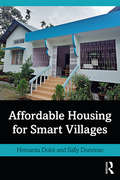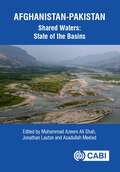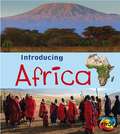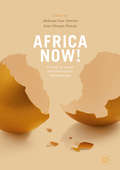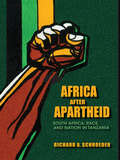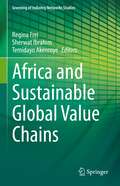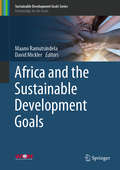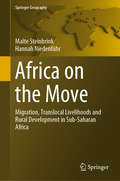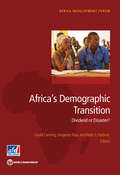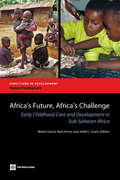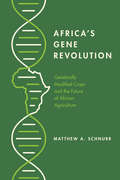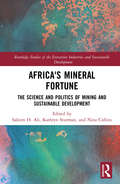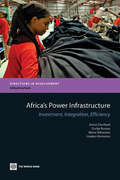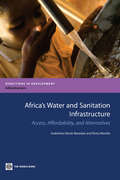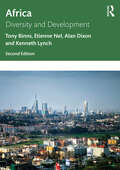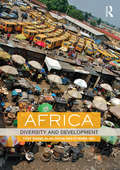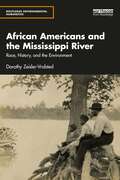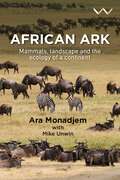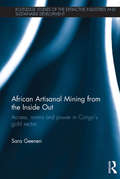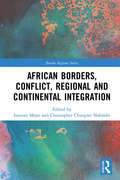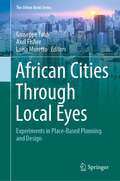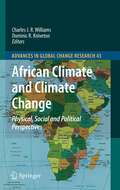- Table View
- List View
Affine, Vertex and W-algebras (Springer INdAM Series #37)
by Paolo Papi Dražen AdamovićThis book focuses on recent developments in the theory of vertex algebras, with particular emphasis on affine vertex algebras, affine W-algebras, and W-algebras appearing in physical theories such as logarithmic conformal field theory. It is widely accepted in the mathematical community that the best way to study the representation theory of affine Kac–Moody algebras is by investigating the representation theory of the associated affine vertex and W-algebras. In this volume, this general idea can be seen at work from several points of view. Most relevant state of the art topics are covered, including fusion, relationships with finite dimensional Lie theory, permutation orbifolds, higher Zhu algebras, connections with combinatorics, and mathematical physics. The volume is based on the INdAM Workshop Affine, Vertex and W-algebras, held in Rome from 11 to 15 December 2017. It will be of interest to all researchers in the field.
Affordable Cleanup?: Opportunities for cost reduction in the decontamination and decommissioning of the nation's uranium enrichment facilities
by Committee on Decontamination Decommissioning of Uranium Enrichment FacilitiesThe Energy Policy Act of 1992 called on the National Academy of Sciences to conduct a study and provide recommendations for reducing the costs of decontaminating and decommissioning (D&D) the nation's uranium enrichment facilities located at Oak Ridge, Tennessee; Raducah, Kentucky; and Portsmouth, Ohio. This volume examines the existing plans and cost estimates for the D&D of these facilities, including such elements as technologies, planning and management, and identifies approaches that could reduce D&D costs. It also assesses options for disposition of the large quantities of depleted uranium hexafluoride that are stored at these sites.
Affordable Housing for Smart Villages
by Sally Donovan Hemanta DoloiThis book initiates a fresh discussion of affordability in rural housing set in the context of the rapidly shifting balance between rural and urban populations. It conceptualises affordability in rural housing along a spectrum that is interlaced with cultural and social values integral to rural livelihoods at both personal and community level. Developed around four intersecting themes: explaining houses and housing in rural settings; exploring affordability in the context of aspirations and vulnerability; rural development agendas involving housing and communities; and construction for resilience in rural communities, the book provides an overview of some of the little understood and sometimes counter-intuitive best practices on rural affordability and affordable housing that have emerged in developing economies over the last thirty years. Drawing on practice-based evidence this book presents innovative ideas for harnessing rural potential, and empowering rural communities with added affordability and progressive development in the context of housing and improved living standards. For a student aspiring to work in rural areas in developing countries it is an introduction to and map of some key solutions around the critical area of affordable housing For the rural development professional, it provides a map of a territory they rarely see because they are absorbed in a particular rural area or project For the academic looking to expand their activities into rural areas, especially in rural housing, it provides a handy introduction to a body of knowledge serving 47% of the world's population, and how this differs from urban practice For the policy makers, it provides a map for understanding the dynamics around rural affordability, growth potential and community aspirations helping them to devise appropriate intervention programs on rural housing and development
Afghanistan-Pakistan Shared Waters: State of the Basins
by Arif Anwar Shakeel Hayat Alias Wardak Fazilda Nabeel Hassaan Furqan Inayatullah Jan Karthikeyan Matheswaran Marie-Charlotte Buisson Muhammad Shahid Iqbal Muhammad Tousif Bhatti Muhammad Zia Hashmi Mujib Ahmad Azizi Paul Pavelic Taimoor AkhtarThere is currently no water cooperation between Afghanistan and Pakistan. Of the nine rivers that flow across the border, none possess a formal agreement or mechanism to manage shared water resources. Further, there is very little information available about the status of environment, hydrology and water resources management for these river basins that could be used as a starting point for dialogues on transboundary water coordination. This State of the Basins book co-develops an overview of the three most important river basins, in collaboration with international experts and water professionals from Afghanistan and Pakistan. It covers water resources, land resources, ecological health, environment, climate change, and the social and economic conditions for sustainable management of these precious resources. It will inform decision making within the two countries, and begin to establish benefits that can accrue from more active collaboration on these shared waters. This book: · Focuses on portions of the Indus shared by Afghanistan and Pakistan. · Features extensive engagement and co-development with Afghan and Pakistani professionals. · Is the first book on the shared waters in the Indus, developed in the context of regional realities associated with post-August 2021 Taliban takeover. The book is aimed at students and researchers in water rights and resources, and government decision makers, private sector investors, donors, intermediary organizations that work directly with farmers, researchers and students. It is a reference book for graduate students and researchers working on these basins, and on transboundary river basin management in Asia and beyond.
Africa (Introducing Continents)
by Chris OxladeTopics covered within the book include where the continent is, climate, geography, animals and plants, countries, people and languages, natural resources, cities, and famous places.
Africa Now!: Emerging Issues and Alternative Perspectives
by Adebusuyi Adeniran Lanre IkuteyijoThis book presents relevant and timely endogenous procedures for addressing the challenge of transforming ideas into sustainable opportunities in Africa. It explores how Africa could be understood in the context of emerging global realities, providing alternative frameworks that will not just be participatory in conception and practice, but equally show a contextual workability for the varying aspects of the developmental enterprise in Africa. Despite having alternative and less cumbersome sources of funding, with commendable economic growth indices, and several economies among the fastest growing globally, African countries have been unable to transmute related opportunities into sustainable human development outcomes for majority of its citizenry. Over four rich sections the authors cover subjects ranging from environment and natural resource management, to governance, economy and sustainable development. The book continues with a section on Education and Human Development and a case study in transnationalism. The final section discusses crime, conflict and regional dynamics, including highly disputed topics such as forced migration and sex trade. This indispensable resource will be of great use to students and researches globally in fields such as sociology, anthropology, environmental studies, politics and economics with a focus on contemporary Africa, as well as to policy planners and human rights activists invested in the future development of Africa.
Africa after Apartheid: South Africa, Race, and Nation in Tanzania
by Richard A. SchroederTracing the expansion of South African business into other areas of Africa in the years after apartheid, Richard A. Schroeder explores why South Africans have not always made themselves welcome guests abroad. By looking at investments in Tanzania, a frontline state in the fight for liberation, Schroeder focuses on the encounter between white South Africans and Tanzanians and the cultural, social, and economic controversies that have emerged as South African firms assume control of local assets. Africa after Apartheid affords a penetrating look at the unexpected results of the expansion of African business opportunities following the demise of apartheid
Africa and Sustainable Global Value Chains (Greening of Industry Networks Studies #9)
by Regina Frei Sherwat Ibrahim Temidayo AkenroyeThis book contains a collection of studies on the interactions between businesses in Africa and Global Value Chains (GVCs) in terms of social, environmental and economic sustainability. This is particularly pertinent given the asymmetrical power distribution between the global buyer and the African supplier, their governance relationships and the ongoing competitive pressures to reduce costs and increase flexibility to meet GVC demands. Rather than focusing on the sustainability of a single organization, GVCs address the sustainability of inter-firm value chains and global industries as a whole. With little differentiation between value chain creation and social / environmental degradation extending to people and raw material extraction (upstream) and disposal or recycling (downstream), sustainability issues need to be at the forefront of African business research interests. Nowadays, sustainability is considered a competitive advantage for a firm looking to join a GVC. Whether sustainability is approached from the viewpoint of an exporting firm motivated to join a GVC in its respective industry or whether a firm’s continuing contractual or collaborative relationship with a buyer depends on its compliance with sustainability standards, both approaches focus on the ability of firms in Africa to benefit from joining sustainable GVCs.
Africa and the Sustainable Development Goals (Sustainable Development Goals Series)
by Maano Ramutsindela David MicklerThe book draws upon the expertise and international research collaborations forged by the Worldwide Universities Network Global Africa Group to critically engage with the intersection, in theory and practice, of the Sustainable Development Goals (SDGs) and Africa’s development agendas and needs. Further, it argues that – and demonstrates how – the SDGs should be understood as an aspirational blueprint for development with multiple meanings that are situated in dynamic and contested terrains. As the SDGs have substantial implications for development policy and resourcing at both the macro and micro levels, their relevance is not only context-specific but should also be assessed in terms of the aspirations and needs of ordinary citizens across the continent. Drawing on analyses and evidence from both the natural and social sciences, the book demonstrates that progress towards the SDGs must meet demands for improving human well-being under diverse and challenging socio-economic, political and environmental conditions. Examples include those from the mining industry, public health, employment and the media. In closing, it highlights how international collaboration in the form of research networks can enhance the production of critical knowledge on and engagement with the SDGs in Africa.
Africa on the Move: Migration, Translocal Livelihoods and Rural Development in Sub-Saharan Africa (Springer Geography)
by Malte Steinbrink Hannah NiedenführThis book discusses migration and space-spanning social network relationships as normal realities of life in African societies. It offers an overview of the research landscape and introduces an agency-centered theoretical model that provides a conceptual framework for translocality. The authors Malte Steinbrink and Hannah Niedenführ plead for a translocal approach to social transformation, showing how the translocality of livelihoods is shaping the lives of half a billion people on the continent and impacting local conditions. Using an action-oriented approach, the book analyzes the effects of translocal livelihoods on diverse aspects of economic, environmental and social change in rural Sub-Saharan Africa. The study thus makes an innovative contribution not only to migration research and development studies but also to the discussion around the policy and practice of development cooperation and planning. It is time to rethink development in light of translocal realities. The book appeals to scholars and researchers in geography, sociology, policy-making and planning, development studies, migration research and rural development.
Africa's Demographic Transition
by David Canning Abdo S. Yazbeck Sangeeta RajaAfrica is poised on the edge of a potential takeoff to sustained economic growth. This takeoff can be abetted by a demographic dividend from the changes in population age structure. Declines in child mortality, followed by declines in fertility, produce a 'bulge' generation and a large number of working age people, giving a boost to the economy. In the short run lower fertility leads to lower youth dependency rates and greater female labor force participation outside the home. Smaller family sizes also mean more resources to invest in the health and education per child boosting worker productivity. In the long run increased life spans from health improvements mean that this large, high-earning cohort will also want to save for retirement, creating higher savings and investments, leading to further productivity gains. Two things are required for the demographic dividend to generate an African economic takeoff. The first is to speed up the fertility decline that is currently slow or stalled in many countries. The second is economic policies that take advantage of the opportunity offered by demography. While demographic change can produce more, and high quality, workers, this potential workforce needs to be productively employed if Africa is to reap the dividend. However, once underway, the relationship between demographic change and human development works in both directions, creating a virtuous cycle that can accelerate fertility decline, social development, and economic growth. Empirical evidence points to three key factors for speeding the fertility transition: child health, female education, and women's empowerment, particularly through access to family planning. Harnessing the dividend requires job creation for the large youth cohorts entering working age, and encouraging foreign investment until domestic savings and investment increase. The appropriate mix of policies in each country depends on their stage of the demographic transition.
Africa's Future, Africa's Challenge: Early Childhood Care and Development in Sub-saharan Africa
by Marito H. Garcia Alan Pence Judith EvansEarly childhood, from birth through school entry, was largely invisible worldwide as a policy concern for much of the twentieth century. Children, in the eyes of most countries, were 'appendages' of their parents or simply embedded in the larger family structure. The child did not emerge as a separate social entity until school age (typically six or seven). 'Africa's Future, Africa's Challenge: Early Childhood Care and Development in Sub-Saharan Africa' focuses on the 130 million children south of the Sahel in this 0-6 age group. This book, the first of its kind, presents a balanced collection of articles written by African and non-African authors ranging from field practitioners to academicians and from members of government organizations to those of nongovernmental and local organizations. 'Africa's Future, Africa's Challenge' compiles the latest data and viewpoints on the state of Sub-Saharan Africa's children. Topics covered include the rationale for investing in young children, policy trends in early childhood development (ECD), historical perspectives of ECD in Sub-Saharan Africa including indigenous approaches, new threats from HIV/AIDS, and the importance of fathers in children's lives. The book also addresses policy development and ECD implementation issues; presents the ECD programming experience in several countries, highlighting best practices and challenges; and evaluates the impact of ECD programs in a number of countries.
Africa's Gene Revolution: Genetically Modified Crops and the Future of African Agriculture
by Matthew A. SchnurrAs development donors invest hundreds of millions of dollars into improved crops designed to alleviate poverty and hunger, Africa has emerged as the final frontier in the global debate over agricultural biotechnology. The first data-driven assessment of the ecological, social, and political factors that shape our understanding of genetic modification, Africa's Gene Revolution surveys twenty years of efforts to use genomics-based breeding to enhance yields and livelihoods for African farmers. Matthew Schnurr considers the full range of biotechnologies currently in commercial use and those in development – including hybrids, marker-assisted breeding, tissue culture, and genetic engineering. Drawing on interviews with biotechnology experts alongside research conducted with more than two hundred farmers across eastern, western, and southern Africa, Schnurr reveals a profound incongruity between the optimistic rhetoric that accompanies genetic modification technology and the realities of the smallholder farmers who are its intended beneficiaries. Through the lens of political ecology, this book demonstrates that the current emphasis on improved seeds discounts the geographic, social, ecological, and economic contexts in which the producers of these crops operate. Bringing the voices of farmers to the foreground of this polarizing debate, Africa's Gene Revolution contends that meaningful change will come from a reconfiguration not only of the plant's genome, but of the entire agricultural system.
Africa's Gene Revolution: Genetically Modified Crops and the Future of African Agriculture
by Matthew A. SchnurrAs development donors invest hundreds of millions of dollars into improved crops designed to alleviate poverty and hunger, Africa has emerged as the final frontier in the global debate over agricultural biotechnology. The first data-driven assessment of the ecological, social, and political factors that shape our understanding of genetic modification, Africa's Gene Revolution surveys twenty years of efforts to use genomics-based breeding to enhance yields and livelihoods for African farmers. Matthew Schnurr considers the full range of biotechnologies currently in commercial use and those in development - including hybrids, marker-assisted breeding, tissue culture, and genetic engineering. Drawing on interviews with biotechnology experts alongside research conducted with more than two hundred farmers across eastern, western, and southern Africa, Schnurr reveals a profound incongruity between the optimistic rhetoric that accompanies genetic modification technology and the realities of the smallholder farmers who are its intended beneficiaries. Through the lens of political ecology, this book demonstrates that the current emphasis on improved seeds discounts the geographic, social, ecological, and economic contexts in which the producers of these crops operate. Bringing the voices of farmers to the foreground of this polarizing debate, Africa's Gene Revolution contends that meaningful change will come from a reconfiguration not only of the plant's genome, but of the entire agricultural system.
Africa's Mineral Fortune: The Science and Politics of Mining and Sustainable Development (Routledge Studies of the Extractive Industries and Sustainable Development)
by Saleem H. Ali Kathryn Sturman Nina CollinsFor too long Africa's mineral fortune has been lamented as a resource curse that has led to conflict rather than development for much of the continent. Yet times are changing and the opportunities to bring technical expertise on modern mining alongside appropriate governance mechanisms for social development are becoming more accessible in Africa. This book synthesizes perspectives from multiple disciplines to address Africa’s development goals in relation to its mineral resources. The authors cover ways of addressing a range of policy challenges, environmental concerns, and public health impacts and also consider the role of globalization within the extractive industries. Academic research is coupled with key field vignettes from practitioners exemplifying case studies throughout. The book summarizes the challenges of natural resource governance, suggesting ways in which mining can be more effectively managed in Africa. By providing an analytical framework it highlights the essential intersection between natural and social sciences, central to efficient and effective harnessing of the potential for minerals and mining to be a contributor to positive development in Africa. It will be of interest to policy makers, industry professionals, and researchers in the extractive industries, as well as to the broader development community.
Africa's Power Infrastructure
by Anton Eberhard Orvika Rosnes Maria Shkaratan Haakon VennemoAfrica's chronic power problems have escalated in recent years into a crisis affecting 30 countries, taking a heavy toll on economic growth and productivity. The region has inadequate generation capacity, limited electrification, low power consumption, unreliable services, and high costs. It also faces a power sector financing gap on the order of $21 billion a year. It spends only about a quarter of what it needs to spend on power, much of this on operating expenditure required to run the continent's high-cost power systems, leaving little for the huge investments needed to provide a long-term solution. Further development of regional power trade would allow Africa to harness larger scale more cost-effective energy sources, reducing energy system costs by $2 billion a year and saving 70 million tons of carbon emissions annually. Economic returns to investments in cross-border transmission are particularly high. But reaping the promise of regional trade depends on a handful of major exporting countries raising the large volumes of finance needed to develop generation capacity for export. It would also require political will in a large number of importing countries that could potentially meet more than half their power demand through trade. Power sector inefficiencies are high, deterring investment in new capacity and electrification. There are three types of sector inefficiencies. First, there are utility inefficiencies, which include system losses, under-collection of revenue and over-manning. These result in a major waste of resources adding up to $4.40 billion a year. Under-collection is the largest component of utility inefficiencies amounting to $1.73 billion, following by system losses at $1.48 billion and by over-manning at $1.15 billion. The second type of sector inefficiency is under-pricing of power. By setting tariffs below the levels needed to cover the actual costs, SSA countries forego revenues of $3.62 billion a year. The third type of inefficiency is poor budget execution. Only 66% of the capital budgets allocated to power are actually spent, with about $258 million in public investment earmarked for the power sector being diverted elsewhere in the budget. Full cost recovery tariffs would already be affordable in countries with efficient large scale hydro or coal-based systems, but not in those relying on small scale oil-based plants. Once regional power trade comes into play, generation costs will fall, and full cost recovery tariffs could be affordable in much of Africa. One of the key policy challenges is to strengthen sector planning capabilities, too often overlooked in today's hybrid markets. A serious recommitment to reforming state-owned enterprises should emphasize improvements in corporate governance more than purely technical fixes. Improving cost recovery is essential for sustaining investments in electrification and regional power generation projects. Closing the huge financing gap will require improving the creditworthiness of utilities and sustaining the recent upswing in external finance to the sector This book is based on extensive data collection undertaken between 2006 and 2008 by the Africa Country Infrastructure Country Diagnostic, an initiative of the Infrastructure Consortium for Africa delegated to the World Bank under the guidance of the African Union, African Development Bank and other multi-lateral and bilateral development institutions.
Africa's Water and Sanitation Infrastructure
by Sudeshna Ghosh Banerjee Elvira MorellaThe welfare implications of safe water and sanitation cannot be overstated. The economic gains from provision of improved services to millions of unserved Africans in enormous. The international adoption of Millennium Development Goals brought the inadequacies of service provision sharply into focus. With only 58% and 31% enjoying access to water and sanitation services respectively, Sub-Saharan Africa is the only continent that is off-track in achieving the MDGs in 2015. The problem is compounded by the fact that a rigorous and credible baseline did not exist on coverage to improved water and sanitation and resources required to meet the MDGs. This book aims to contribute to this gap by collecting a wealth of primary and secondary information to present the most up-to-date and comprehensive quantitative snapshot of water and sanitation sectors. The book evaluates the challenges to the water and sanitation sectors within the urban and rural areas and deepen our understanding of drivers of coverage expansion in the context of financing, institutional reforms, and efficiency improvements. Finally, the book establishes the investment needs for water and sanitation with a target of meeting the MDGs and compares with the existing financing envelopes, disaggregated by proportions that can be recouped by efficiency gains and net financing gaps. The directions for the future draw on lessons learned from best practices and present the menu of choices available to African countries. There is no recipe book that neatly lays out the possible steps the country should adopt to enhance coverage and quality of service. The challenges differ to a significant extent among African countries and solutions must be tailored to individual national or regional conditions.
Africa: Diversity and Development
by Tony Binns Etienne Nel Alan Dixon Kenneth LynchAfrica: Diversity and Development introduces and de-mystifies Africa’s diversity and dynamism, and considers how its peoples and environments have interacted through time and space. The book examines the background and diversity of Africa’s social, cultural, economic, political and environmental systems, as well as key development issues which have affected Africa in the past and are likely to be significant in shaping the future of the continent. These include: the impact of HIV/AIDS; sources of conflict and post-conflict reconstruction; the state and governance; the nature of African economies in a global context and future development trajectories. This second edition features new chapters on history and governance, health, separate chapters on rural and urban development and updated content on all aspects of the continent, particularly aspects of culture and ethnicity. It is richly illustrated throughout with diagrams and plates and contains a wealth of detailed up-to-date case studies and current data. This textbook is a refreshing interdisciplinary text which enhances understanding of the background to Africa’s current position and clarifies possible future scenarios. It will be a valuable resource for students taking modules on Africa, African Development and Geography of Africa, and will also prove useful to students in the wider fields of Geography, Development Studies, Global Studies, Environment and Society and African Politics.
Africa: Diversity and Development (Country Fact Files Ser.country Fact Files)
by Tony Binns Etienne Nel Alan DixonFor many, Africa is regarded as a place of mystery and negative images, where reports of natural disasters and civil strife dominate media attention, with relatively little publicity given to any of the continent’s more positive attributes. Africa has at last begun to receive the depth of interest it has long deserved, in the shape of debates about trade, aid and debt, the ‘Make Poverty History’ campaign, and the UK's ‘Commission on Africa’. But, behind the superficial media façade, Africa is a diverse, complex and dynamic place, with a rich history and a colonial engagement that, although short-lived, was fundamental in determining the long-term future of the continent. At the start of the second decade of the twenty-first century, when the world is engulfed in a major financial crisis, Africa has the dubious distinction of being the world’s poorest continent. This book introduces and de-mystifies Africa’s diversity and dynamism, and considers how its peoples and environments have interacted through time and space. The background and diversity of Africa’s social, cultural, economic, political and environmental systems is examined, as well as key development issues which have affected Africa in the past and are likely to be significant in shaping the future of the continent. These include: the impact of HIV/AIDS; sources of conflict and post-conflict reconstruction; the state and governance; the nature of African economies in a global context and future development trajectories. Africa: Diversity and Development is a refreshing interdisciplinary text which enhances understanding of the background to Africa’s current position and clarifies possible future scenarios. It is richly illustrated throughout with diagrams and plates, and contains a wealth of detailed case studies and current data.
African Americans and the Mississippi River: Race, History, and the Environment (Routledge Environmental Humanities)
by Dorothy Zeisler-VralstedThis book follows the historical trajectory of African Americans and their relationship with the Mississippi River dating back to the 1700s and ending with Hurricane Katrina and the still-contested Delta landscape. Long touted in literary and historical works, the Mississippi River remains an iconic presence in the American landscape. Whether referred to as "Old Man River" or the "Big Muddy," the Mississippi River represents imageries ranging from the pastoral and Acadian to turbulent and unpredictable. However, these imageries—revealed through the cultural production of artists, writers, poets, musicians, and even filmmakers—did not reflect the experiences of everyone living and working along the river. Missing is a broader discourse of the African American community and the Mississippi River. Through the experiences of African Americans with the Mississippi River, which included narratives of labor (free and enslaved), refuge, floods, and migration, a different history of the river and its environs emerges. The book brings multiple perspectives together to explore this rich history of the Mississippi River through the intersection of race and class with the environment. The text will be of great interest to students and researchers in environmental humanities, including environmental justice studies, ethnic studies, and US and African American history.
African Ark: Mammals, landscape and the ecology of a continent
by Dr. Ara MonadjemThe story of how Africa’s mammals have helped shape the continent’s landscapes over time to support an amazing diversity of lifeAfrica is home to an amazing array of animals, including the world’s most diverse assortment of large mammals. These include the world’s largest terrestrial mammal, the African elephant, which still roams great swathes of the continent alongside a host of other well-known large mammals with hooves such as hippopotamuses, giraffes, rhinoceroses, and zebras. African Ark: Mammals, Landscape and the Ecology of a Continent tells the story of where these mammals have come from and how they have interacted to create the richly varied landscape that makes up Africa as we know it today. It gives an equal airing to small mammals, such as rodents and bats, which are often overlooked by both naturalists and zoologists in favor of their larger cousins. African Ark not only describes the diversity of African mammals and the habitats in which they live; it also explains the processes by which species and population groups are formed and how these fluctuate over time. A book on mammals would not be complete without attention placed on the impact of megafauna on the environment and the important roles they play in shaping the landscape. In this way, mammals such as elephants and rhinoceros support countless plant communities and the habitats of many smaller animals. The book brings in a human perspective as well as a conservation angle in its assessment of the interaction of African mammals with the people who live alongside them. African Ark is at once scientifically rigorous and accessible for the layperson and student alike, while drawing on the contributions of numerous zoologists, ecologists and conservationists dedicated to the understanding of Africa and its wildlife.
African Artisanal Mining from the Inside Out: Access, norms and power in Congo’s gold sector (Routledge Studies of the Extractive Industries and Sustainable Development)
by Sara GeenenArtisanal mining is commonly associated with violent conflict, rampant corruption and desperate poverty. Yet millions of people across Sub Sahara Africa depend on it. Many of them are living in eastern Democratic Republic of Congo (DRC), home to important mineral reserves, but also to a plethora of armed groups and massive human rights violations. African Artisanal Mining from the Inside Out provides a rich and in-depth analysis of the Congolese gold sector. Instead of portraying miners and traders as passive victims of economic forces, regional conflicts or disheartening national policies, it focuses on how they gain access to and benefit from gold. It shows a professional artisanal mining sector governed by a set of specific norms, offering ample opportunities for flexible employment and local livelihood support and being well-connected to the local economy and society. It argues for the viability of artisanal gold mining in the context of weak African states and in the transition towards a post-conflict and more industrialized economy. This book will be of great interest to researchers and postgraduates studying natural resources and development as well as those in development studies, African studies, sociology, political economy, political ecology, legal pluralism, and history.
African Borders, Conflict, Regional and Continental Integration (Border Regions Series)
by Inocent Moyo Christopher Changwe NshimbiThis book looks at the ways African borders impact war and conflict, as well as the ways continental integration could contribute towards cooperation, peace and well-being in Africa. African borders or borderlands can be a source of problems and opportunity. There is often a historical, geospatial and geopolitical architecture rooted in trajectories of war, conflict and instability, which could be transformed into those of peace, regional and continental integration and development. An example is the cross-border and regional response to the Boko Haram insurgency in West Africa. This book engages with cross-border forms of cooperation and opportunity in Africa. It considers initiatives and innovations which can be put in place or are already being employed on the ground, within the current regional and continental integration projects. Another important element is that of cross-border informality, which similarly provides a ready resource that, if properly harnessed and regulated, could unleash the development potential of African borders and borderlands. Students and scholars within Geography, International Relations and Border Studies will find this book useful. It will also benefit civil society practitioners, policymakers and activists in the NGO sector interested in issues such as migration, social cohesion, citizenship and local development.
African Cities Through Local Eyes: Experiments in Place-Based Planning and Design (The Urban Book Series)
by Giuseppe Faldi Axel Fisher Luisa MorettoThis book provides readers with a wide overview of place-based planning and design experiments addressing such powerful transformations in the African built environment. This continent is currently undergoing fast paced urban, institutional and environmental changes, which have stimulated an increasing interest for alternative architectural solutions, urban designs and comprehensive planning experiments. The international and balanced array of the collected contributions explore emerging research concepts for understanding urban and peri-urban processes in Africa, discuss bottom-up planning and design practices, and present inspirational and innovative co-design methods and participatory tools for steering such change through public spaces, sustainable services and infrastructures. The book is intended for students, researchers, decision-makers and practitioners engaged in planning and design for the built environment in Africa and the Global South at large.
African Climate and Climate Change: Physical, Social and Political Perspectives (Advances in Global Change Research #43)
by Charles J. Williams Dominic R. KnivetonCompared to many other regions of the world, Africa is particularly vulnerable to the effects of climate change and variability. Widespread poverty, an extensive disease burden and pockets of political instability across the continent has resulted in a low resilience and limited adaptative capacity of African society to climate related shocks and stresses. To compound this vulnerability, there remains large knowledge gaps on African climate, manifestations of future climate change and variability for the region and the associated problems of climate change impacts. Research on the subject of African climate change requires an interdisciplinary approach linking studies of environmental, political and socio-economic spheres. In this book we use different case studies on climate change and variability in Africa to illustrate different approaches to the study of climate change in Africa from across the spectrum of physical, social and political sciences. In doing so we attempt to highlight a toolbox of methodologies (along with their limitations and advantages) that may be used to further the understanding of the impacts of climate change in Africa and thus help form the basis for strategies to negate the negative implications of climate change on society.


